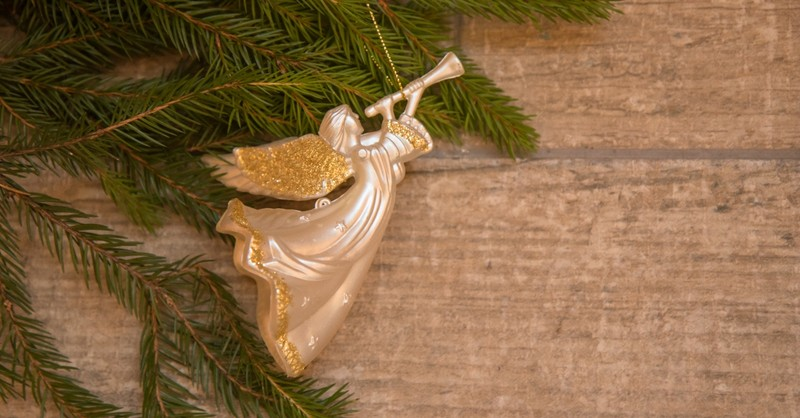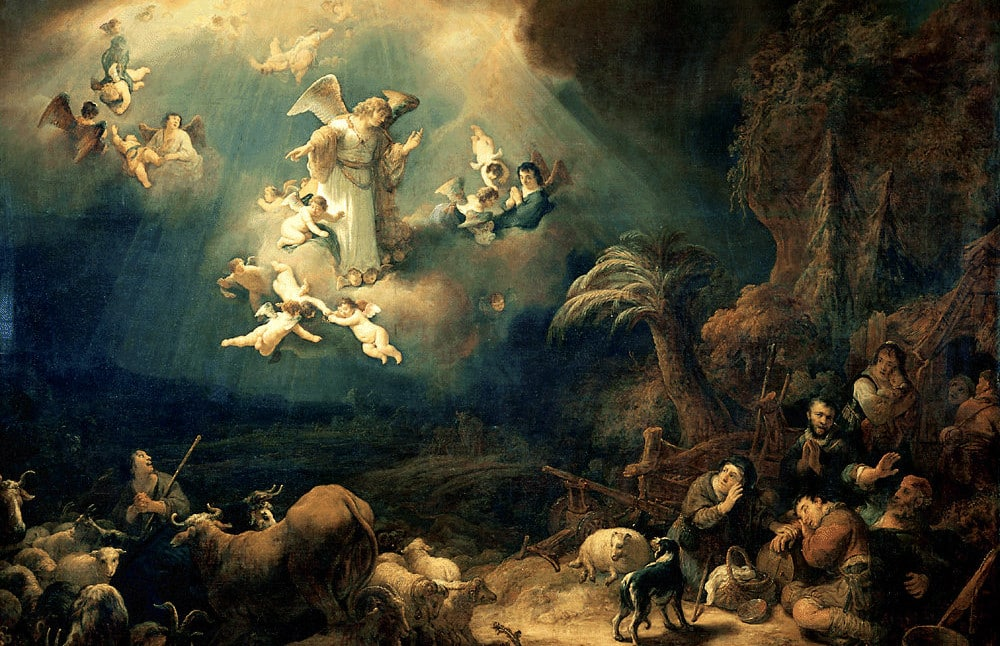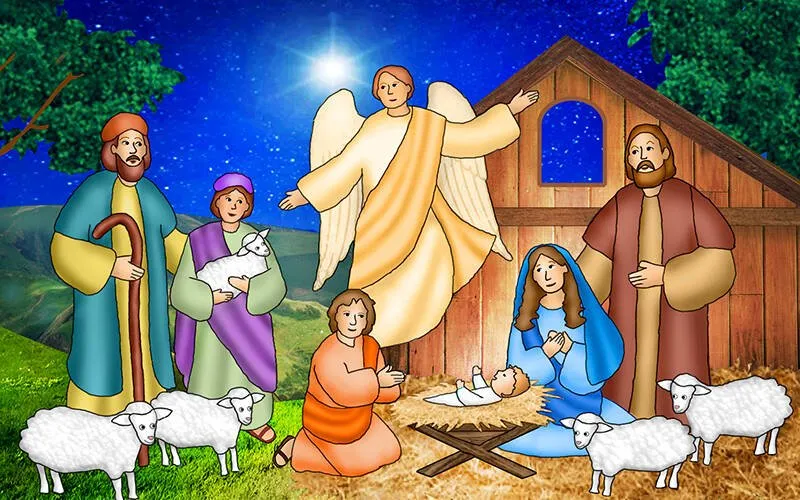What Is the Significance of Angels at Christmas?

At Christmas, we often find ourselves thinking more about angels. We sing carols such as “Hark the Herald Angels Sing,” and our Christmas trees are adorned with angel ornaments. We exchange Christmas cards featuring angels on the front, and some ladies wear angel-themed jewelry. Many of our favorite Christmas movies include angels, like Clarence, the second-class angel striving to earn his wings in Jimmy Stewart’s “It’s a Wonderful Life.”
From childhood, many of us have heard stories about angels. In his 1975 book “Angels: God’s Secret Agents,” Billy Graham shares a story about the passing of his wife’s grandmother: “The room seemed to fill with a heavenly light. She sat up in bed and almost laughingly said, ‘I see Jesus. He has his arms outstretched toward me. I see Ben [her husband who had died some years earlier], and I see the angels.’ Then she slumped over, absent from the body but present with the Lord.”
Nativity scenes displayed during Christmas often include the angel Christmas tree topper, making angels a staple of holiday decorations. This is appropriate, as both Matthew and Luke mention angels in their accounts of Jesus’ birth. But beyond the acknowledgment of an angel’s involvement in the Nativity, what else do we truly know about these celestial beings?
Who Are the Angels in the Christmas Stories?
Angels are not exclusive to the Christmas story; they appear throughout the entire Bible. These spiritual beings were created by God to carry out His will and deliver divine messages. The Greek term for angel, “messenger,” highlights their primary function. According to Psalm 148:5, angels were created by God, and Hebrews 1:14 describes them as spirits sent to serve those who believe.
The Bible mentions that humans were made a little lower than angels (Psalm 8:5), but it also states that Jesus, though temporarily lower than the angels when He became human, is now exalted above them (Hebrews 1:4). As God’s messengers, angels deliver news, share prophecies, and perform various acts to aid Christians.
Angels are introduced early in Scripture. In Genesis 2:1, they are referenced as part of God’s completed creation of the heavens and the earth. Genesis 19:1 recounts how angels warned Lot and his family to flee before the destruction of their city. In Genesis 28:10-12, Jacob dreams of angels ascending and descending a ladder between heaven and earth. An angel appears to Moses in Exodus 3:2, calling him to lead the Israelites out of Egypt. In Judges 2:1-4, an angel delivers a powerful message to the Israelites, and Psalm 91 speaks of angels commanded by God to protect people.
The New Testament also contains numerous angelic encounters. After Jesus fasts for forty days and nights in the desert and is tempted by the devil, angels attend to Him (Matthew 4:11). Jesus mentions angels in Matthew 18:10, noting that they always see the face of His Father in heaven. In Acts 12:7, an angel rescues Peter from prison. Additionally, angels are expected to play a role in the second coming of Jesus Christ (Matthew 25:31). Throughout the Bible, angels undertake significant tasks and deliver vital messages.
In the Christmas story, angels play pivotal roles. An angel appears to Joseph in a dream, revealing the news of Mary’s virgin birth (Matthew 1:20). Shepherds watching over their sheep receive the good news of Jesus’ birth from an angel (Luke 2:10). A multitude of heavenly hosts joins the angel, praising God (Luke 2:13). Finally, the angel Gabriel is specifically named in the Christmas narrative.

the Significance of Christmas Angels
The story of Christ’s birth is a profound narrative filled with God’s grace, generosity, and humility. Born under modest circumstances to a young girl of no notable status or wealth, Jesus’s arrival is a tale many can relate to. In contrast, angels, celestial beings of majesty and power, descend from heaven, embodying a different kind of significance in the Christmas narrative.
1. Angels Heralded the Birth of Jesus
Angels played a central role by delivering the joyous news of Jesus’ birth. According to Luke 2:8-14, angels appeared to shepherds in Bethlehem, heralding the birth of the Messiah, the Savior of the world. Suddenly, a multitude of the heavenly host appeared with the angel, praising God and saying, ‘Glory to God in the highest heaven, and on earth peace to those on whom His favor rests.’”
The shepherds witnessed an awe-inspiring vision as countless angels appeared, proclaiming the birth of the long-awaited Messiah. Remarkably, these humble shepherds were the first to hear this life-altering announcement. As caretakers of the sacrificial lambs used to atone for sins, they were uniquely honored to learn first of Jesus’ birth – the Lamb of God whose ultimate sacrifice would save humanity. Another profound element of the event was the divine light that illuminated the scene that night. Angels, beings of light themselves, reflected God’s radiant glory as they proclaimed the coming of Jesus, the Light of the World.

2. The Inspirational Role of Angels in Christmas
The presence of angels during Christmas is profoundly inspiring. It serves as a reminder that the conception, birth, and life of Jesus were divine events that altered the course of history, bridging the gap between God the Father and sinful humanity. From Gabriel’s pivotal role to the heavenly hosts exalting the Lord, the angelic involvement in the Christmas narrative fills us with excitement, hope, and the unique joy brought by the life and ministry of our Lord and Savior, Jesus Christ.
3. The Angel’s Appearance Signified God’s Peace
The angel’s approach to the shepherds signified that God is personal and deeply concerned for even the humblest of people. Different translations vary in how they describe this encounter: the ESV, NIV, and NLT state the angel “appeared to them” (v. 9), while the Berean, NASB, and CSB use phrases like “stood before them” or “stood by them.”
In the original Greek, the term used is “ephistémi,” which means “to set upon, to stand upon, or to be present.” This implies that God drew near to the lowly through His powerful messengers. The poor were indeed blessed to become heralds of good news. One commentary notes that the angel “stood upon the earth at their side, not floating above them in the heavens, as often depicted. This shows a deeper fellowship and sympathy with humanity.”
Even if “stood” translates to “set upon,” it suggests that the angel descended from above, signifying a restored relationship with God through Christ. The peace (eiréné) mentioned here is more than the absence of conflict; it denotes “quietness, rest,” and “wholeness when all essential parts are joined together.” This is God’s gift of wholeness.
4. Angels Delivered Joyful Messages
Angels are popular choices for the Christmas tree topper. because they act as messengers between heaven and earth. Their appearance in Bethlehem to announce the greatest message in history and worship God is celebrated worldwide. People often decorate their trees with angel ornaments, ranging from simple designs to those with microchips enabling them to sing, glow, and play music. The tradition of placing tinsel on Christmas trees, originally streamers said to be “angel hair,” also enhances this festive imagery. Angel Christmas lights emphasize their radiant nature, reminding us of the wonder of how angels served God during Jesus’ birth and continue to serve Him today.
5. Angels Modeled Perfect Praise
If any human is grand, graceful, and elegant, an angel is exponentially more so. The heavenly hosts, as seen in the shepherds’ reaction, were awe-inspiring creatures of light. Wayne Grudem notes that “angels are called ‘mighty ones who do His word’” (Psalm 103:20). Matthew 28:3 describes the angel at Christ’s empty tomb with an appearance “like lightning, and his clothing white as snow.”
Yet, the angels who heralded Christ’s birth served God with joy and humility, not pride. “Angels show us what perfect obedience looks like and model worship,” says Grudem. Luke 2:13-14 narrates that “a multitude of the heavenly host praised God,” sharing the good news with humble shepherds. Angels humbled themselves before God, incarnate as helpless infants, teaching us that worship is not for the weak. Luke 2:13 suggests that thousands of angels worshipped the newborn Jesus.
Conclusion
Angels play a crucial role in our Christmas celebrations because they were integral to the first Christmas. As God’s messengers, they delivered history’s most significant announcement: the arrival of the world’s Savior. They were assigned by God to make vital proclamations to Mary and Joseph regarding Jesus’ birth. Since that first Christmas in Bethlehem, people worldwide have celebrated with angel Christmas decorations and carols that mention angels. Christmas angels remind us that God is with us, a core message of Christmas and a cause for celebration!
